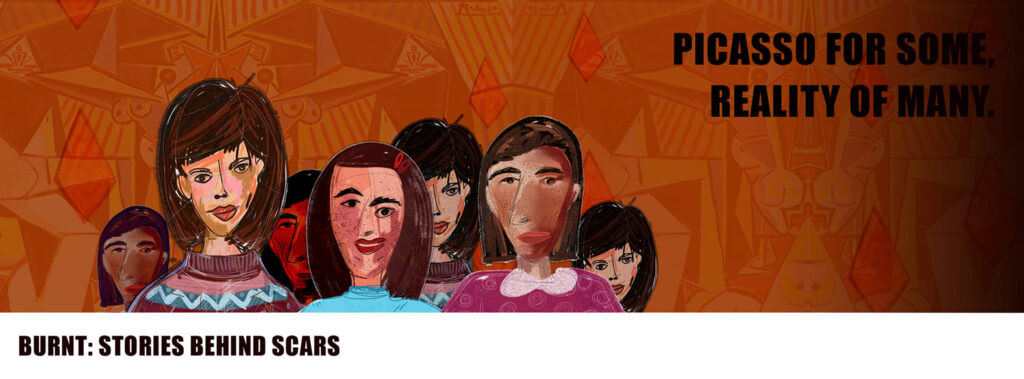BURNT - stories behind scars

Acid attack is an attack not just on the physicality of a person but on their very identity. The victims feel their entire life corroded away under the sting of the acid, and the survivors of acid attack live each day under the burden of the changed perceptions of society towards them.
The survivors find themselves in a changed world, where no one wants to accept them anymore and listen or understand their story. Stripped of all the dignity of their former lives, most of the survivors are forced to live in isolation, often ending up suffering from depression and suicidal thoughts. They even find all avenues of employment closed to them, making them question their identity further.
When it comes to instances of acid attacks, India is among the top 10 countries, with states like Uttar Pradesh and West Bengal topping the charts. According to the data provided by the National Crime Records Bureau, between 2014 and 2018, there have been a total of 596 acid attack cases in the country with 1483 victims of acid attacks.
Despite the rise in instances of acid attack in the country, the total number of acid attack cases that the police investigated has shown a downward trend, with the number dropping from 196 in 2016 to 150 in 2018.
Even after the investigation, justice is a long way for acid attack survivors. When it comes to conviction in the 849 acid attack cases which were sent to trial in 2016 and 2017, only a total of 25 cases resulted in conviction out of the 67 which completed trial.
While the conviction rate in acid attack cases went up in 2018, only 19 out of the 523 cases which went for trial ended in conviction.
The number of acid attack cases keep adding up but the perpetrators usually get off scot free after running people’s lives. And the survivors have little recourse and acceptance to be had, losing their very right to a dignified life.
But many organizations are coming to the aid of acid attack survivors, helping them get back to a semblance of normal life. One such initiative was taken up by Sheroes Cafe which exclusively employs acid attack survivors to help them regain financial independence and a sense of identity.

While cases like that of Laxmi Agarwal led to some much needed acknowledgement of the heinous nature of the crime through the introduction of separate sections in the Indian Penal Code – 326A and 326B – making the offence non-bailable and specifying a minimum of ten years to life imprisonment. Yet, most survivors find their voices muted when trying to tell their stories. So, Tapas foundation initiated a documentary series ‘BURNT – stories behind scars’ of the brave women working at the Sheroes cafe in Lucknow, providing them a platform to tell their stories.
Our founder, Vipul Singh interviewed these women in 2017 on their lives before the incidents, the events leading up to the incident, their experience of the attack, and their lives since, bringing forth a series of acid attack survivor stories.
Each of these women, Jeetu, Preeti, Kavita, Rupali and Anshu (link to individual videos) have shown tremendous courage in rebuilding their lives and living them on their own terms post the attacks.
Yet, justice is still distant for some of them. And their stories are reminiscent of the fact that there is an immediate need for attention and action in the matter. While newer and stricter laws have been introduced to punish the offenders, much more emphasis is needed in restricting the sale of such corrosives in the first place. Despite new guidelines, it still remains fairly easy for anyone to procure this life-altering substance.
This is our initiative, alongside the likes of other organizations working on rehabilitating acid attack survivors like Make Luv Not Scars and the acclaimed movie ‘Chhapak’ to end the stigma around acid attack survivors while pressing for stricter measures to curb the instances of acid attack. We hope to have highlighted the issue further for it to get the attention it deserves, and for the survivors to get to live their life with dignity as a basic human right.

